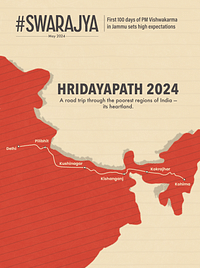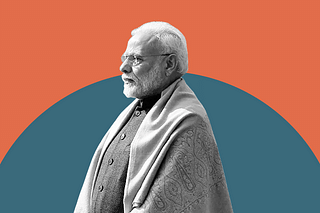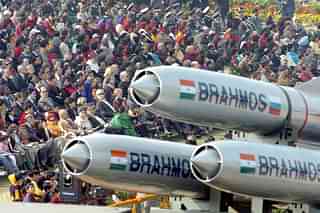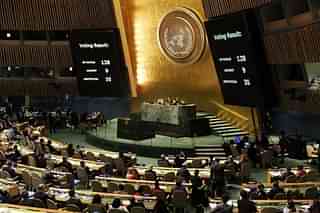Politics
Revdism Has Replaced Rowdyism As The New Menace In Indian Politics. Part I — The Politics
Banuchandar Nagarajan
Jan 03, 2024, 01:08 PM | Updated 02:26 PM IST
Save & read from anywhere!
Bookmark stories for easy access on any device or the Swarajya app.
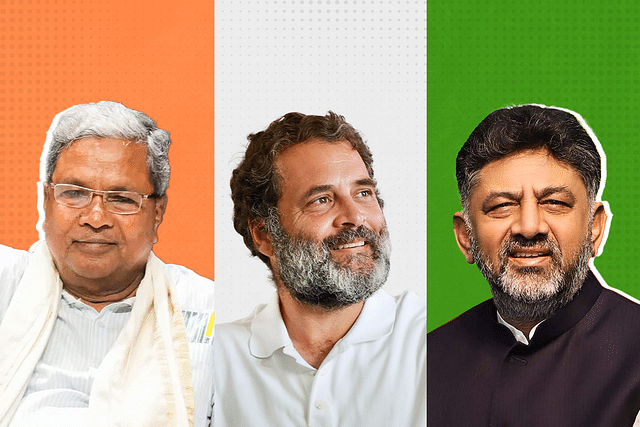
Let me begin by asking a provocative question — what stops a state government from giving a gold coin to every woman in the state? Let me push it. What stops the state from giving the gold coin every month?
I would bet that every chief minister is asking the state's finance secretary to make space for doles. Even if the state does not have a history of revdis, it would definitely be tempting for a public representative to think about giving something away like a king or queen would. The two personalities that started the "dole wars", J Jayalalithaa and M Karunanidhi, definitely were such personalities.
There is a strange dichotomy in politics in India. It is elevating at the national level and transactional at the state level. Roughly so! Of course, there are exceptions in states such as Uttar Pradesh, Assam, etc, where BJP is focused on building long-term competitive advantages.
With large-scale corruption exposed through raids by the Enforcement Directorate in various states, people have become disillusioned with "big talk" of state leaders. They are reduced to asking, "what is in it for me directly?" Money power is on blatant display during elections which is reflected in the every innovative methods of distribution of cash and liquor.
There are a few political-economy reasons for the "rise of revdis". One is the need for political parties to distinguish themselves. The BJP government at the Centre has been following the paradigm of "input-based" development, by focusing on infrastructure, skill-building, security, investment promotion and so on. It results in a healthy development of capital goods and skills, resulting in both short-term and long-term benefits. In other words, it follows the "teach a man to fish" principle. Even in the recently launched "Vishwakarma scheme", the focus was on skills, infrastructure and intellectual property. The central government uses Direct Benefit Transfer only for ameliorative purposes such as the Krishi Samman Nidhi, Ujjwala Yojana, etc.
On the other hand, the opposition follows the "give the man a fish" principle, promising instant gratification. It panders to the lower transactional instincts of citizenship. The "guarantees" of the Congress being implemented in Karnataka and Telangana have to be seen with this lens. Remember that these two states are among the richest in India in terms of per-capita GDP. During the election campaigns in these states, arguments were constructed pointing to the skewed geographic and community-based accrual of benefits. They added that the only way for everyone to get a fair share was to give away doles and cash. Even the BJP-led state government in Madhya Pradesh belongs to this category.
This argument finds favour with many bleeding-heart commentators that would not even tolerate the words "revdis" or "doles". They call it "welfare". Some even said that this is democracy's way of maintaining social cohesion. What they do not realise is that with debt positions climbing, the states face the opportunity cost of building capital infrastructure and will result in secular decline of the state's prospects.
For example, the Congress government in Karnataka, which is now neck-deep in fiscal woes, would not even be able to fulfill its own election promise of expanding the metro line by 70 kms. Tamil Nadu is the top borrower in recent years. It plans to borrow Rs 1.43 lakh crore this fiscal year, out of which Rs 51,000 crore go into just debt-servicing.
A saving grace of the recent campaigns in Karnataka and Telangana is that the Congress has gone slow on reversal to the Old Pension Scheme (OPS). The implementation is wreaking havoc to the coffers of Himachal Pradesh. It is politically thoughtless as well, because it targets a small base (about 1.5 lakh in HP) of retired government employees. The irony is that the Congress did not even have the wisdom to save on the OPS to give away more doles! This happens when politics become solely a game of rhetoric and promising anything that the opponent is not in favour of becomes the playbook. This feature is exactly the argument used by opponents of democracy itself!
There are multifold ramifications of these ever-increasing deficits. In the near term, old school corruption will come back with a vengeance, from over-counting of beneficiaries. Look at Tamil Nadu's distribution of Rs 1,000 for about 1 crore women every month. It is begging for an ED raid for later. Current capacities suffer from poor maintenance, eg, buses in Karnataka. The list can go on.
In the medium term, state government bonds will get dearer, thus exacerbating infrastructure woes. Over the course of time, investors will flee, thus reducing tax revenues and the money available for normal functioning of the government. The goose laying the golden egg, thus dies. When industry starts moving away, it can become a trend. Narratives are sticky. Hyderabad and Bengaluru cannot be complacent. Every state capital is now their competitor.
It seems like ancient-regime, but there was a state government not too long ago that focused on building roads and check-dams, made electricity reforms with separate feeders for farmers, conducted pioneering investor summits etc. It is another stunning aspect of Narendra Modi's political journey that he did it virtuously without pandering to people or ruining the state finances.
Most old-school politicians naturally tend towards being Robinhoods. They do not upgrade themselves philosophically and become efficient administrators. It should be acknowledged that to be skilled in both politics and administration is a tough ask. It is akin to doing a double PhD. That is why PM Modi is so unique!
We will look at the economic dimension of the ‘Revdism’ in the next part.
Save & read from anywhere!
Bookmark stories for easy access on any device or the Swarajya app.
Banuchandar is a political and public policy advisor. He posts at @Banu4Bharat.
Support Swarajya's 50 Ground Reports Project & Sponsor A Story
Every general election Swarajya does a 50 ground reports project.
Aimed only at serious readers and those who appreciate the nuances of political undercurrents, the project provides a sense of India's electoral landscape. As you know, these reports are produced after considerable investment of travel, time and effort on the ground.
This time too we've kicked off the project in style and have covered over 30 constituencies already. If you're someone who appreciates such work and have enjoyed our coverage please consider sponsoring a ground report for just Rs 2999 to Rs 19,999 - it goes a long way in helping us produce more quality reportage.
You can also back this project by becoming a subscriber for as little as Rs 999 - so do click on this links and choose a plan that suits you and back us.
Click below to contribute.
